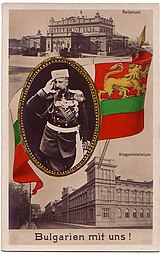Aleksandar Protogerov
Aleksandar Protogerov | |
|---|---|
 | |
| Native name | Александър Протогеров |
| Born | 28 February 1867 Ohrid, Ottoman Empire |
| Died | 7 July 1928 (aged 61) Sofia, Bulgaria |
| Allegiance | |
| Service/ | |
| Rank | Lieutenant General |

Alexandar Protogerov (Bulgarian: Александър Протогеров; 28 February 1867 – 7 July 1928) was a Bulgarian Army general, politician and revolutionary, as well as a member of the revolutionary movement in the Ottoman regions of Macedonia, Thrace and Pomoravlje.[1] Protogerov was a Bulgarian Freemason and held a leading position (Grand Master) in the lodge where he was a member.[2]
Biography
[edit]
Protogerov was born in 1867 in Ohrid in the Ottoman Empire (now in North Macedonia). Later he graduated there with his primary education in the local Bulgarian Exarchate school. On 5 October 1882 he entered the Military School in Sofia and as a cadet was a volunteer in the Serbo-Bulgarian War (1885). In 1887 he graduated from the Military School and was assigned to the infantry. On 18 May 1890 he was already a lieutenant. On 2 August 1894 he became a captain and served as an adjutant in the 1st Brigade of the 5th Danube Infantry Division. He served in Rousse, where he was the leader of the Bulgarian Officers' Brotherhoods. Later he served as a company commander of the 32nd Zagore Infantry Regiment. He was among the leaders of the Supreme Macedonian-Adrianople Committee. Protogerov took part in the Gorna Dzhumaya uprising in 1902 and in the Ilinden-Preobrazhenie Uprising. Later joined the Internal Macedonian Revolutionary Organization.[3]
In the Balkan Wars, Protogerov was one of the organizers of the Macedonian-Adrianopolitan Volunteer Corps and Assistant Commander of this military unit. During the First World War, he commanded the Third Infantry Brigade of the 11th Macedonian Infantry Division and then became commander of the Bulgarian troops in the Pomoravlje region of Serbia. There he suppressed the Toplica Uprising, commanding an army that committed a large number of war crimes, including cruel murders of thousands of women, children and the elderly. Later, as commandant of Sofia, Protogerov suppressed the Bulgarian soldier's uprising.[4] After World War I, Protogerov was elected as one of the leaders of IMRO. In 1924, IMRO entered negotiations with the Comintern about collaboration between the communists and the Macedonian movement and the creation of a united Macedonian movement. Protogerov and Petar Chaulev probably signed the so-called May Manifesto about forming a Balkan Communist Federation and cooperation with the Soviet Union in Vienna. Later, Protogerov denied through the Bulgarian press that they had ever signed any agreements, claiming that the May Manifesto was a communist forgery. Shortly after, Todor Alexandrov was assassinated in unclear circumstances and IMRO came under the leadership of Ivan Mihailov, who became a powerful figure in Bulgarian politics. In 1925 Protogerov was injured in result of the organized by the communists St Nedelya Church assault.
In IMRO itself, a major split arose between Mihailov's wing, supported by Andrey Lyapchev, and Protogerov's wing, supported by Aleksandar Tsankov. The faction led by Protogerov opted for continuing with the tactics of guerrilla warfare, while this led by Mihailov insisted on individual terrorist attacks. The result of this split and communists conspiracies was further strife within the organisation and several high-profile murders, including that of Protogetov himself.[5]
Military Awards
[edit]- Soldier's Cross of Bravery III grade, Bulgaria
- Military Order of Bravery III grade, Bulgaria
- Royal Order of St. Alexander III grade with swords in the middle, Bulgaria
- People's Order of Military Merit III grade on military ribbon, Bulgaria
References
[edit]- ^ Raymond Detrez, Historical Dictionary of Bulgaria, Historical Dictionaries of Europe, Edition 3; Rowman & Littlefield, 2014, ISBN 1442241802, pp. 400-401.
- ^ Георги Балански, Генерал Александър Протогеров – първият Велик майстор на Великата ложа на България. Сп. „Зидарски преглед“, книга IV-V, 2010 г.
- ^ Янакиев, Николай. Македонските българи-офицери в Горноджумайското въстание, сп. Македонски преглед XV (4). 1992. ISSN 2279-0861. стр. 119.
- ^ Frederick B. Chary, The History of Bulgaria, The Greenwood Histories of the Modern Nations; ABC-CLIO, 2011, ISBN 0313384479, p. 70.
- ^ Dimitar Bechev, Historical Dictionary of North Macedonia; Historical Dictionaries of Europe, Edition 2, Rowman & Littlefield, 2019; ISBN 1538119625, p. 246.
Sources
[edit]- Вазов, В., Животописни бележки, София, 1992, Военноиздателски комплекс „Св. Георги Победоносец“, ISBN 954-509-002-2, с.123
- 1867 births
- 1928 deaths
- People from Ohrid
- Bulgarian revolutionaries
- Members of the Internal Macedonian Revolutionary Organization
- Bulgarian generals
- People of the Serbo-Bulgarian War
- Bulgarian military personnel of the Balkan Wars
- Bulgarian military personnel of World War I
- Recipients of the Order of Bravery
- Recipients of the Order of Military Merit (Bulgaria)
- Assassinated Bulgarian politicians
- Assassinated military personnel
- Macedonian Bulgarians
- People murdered in Bulgaria
- 20th-century Bulgarian politicians
- Recipients of the Iron Cross (1914), 2nd class
- Deaths by firearm in Bulgaria
- Bulgarian Freemasons
- People from the Ottoman Empire
- Politicians assassinated in the 1920s


